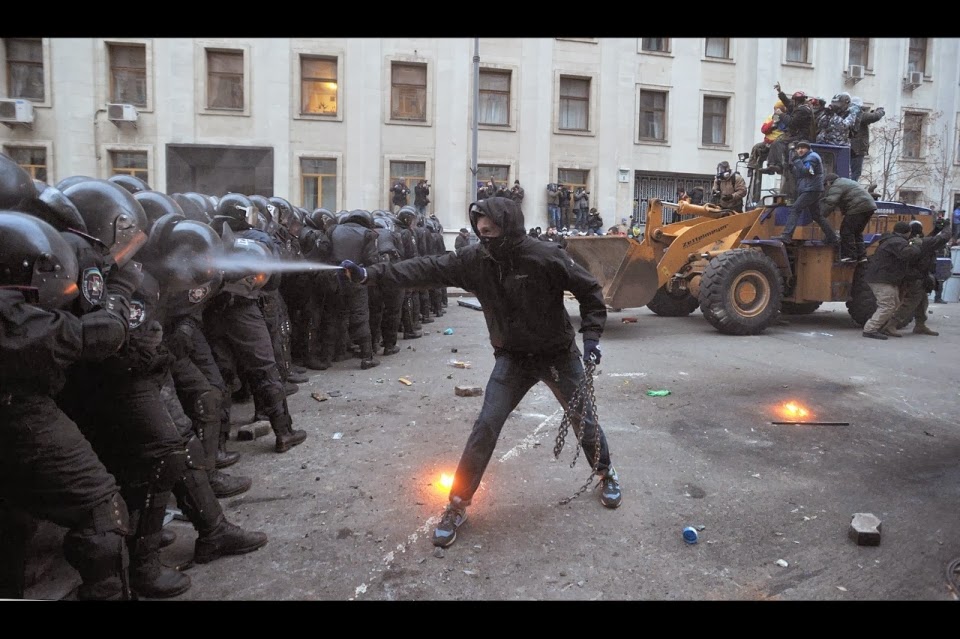To start: How/why did this all begin?
There is a rich history of Ukrainian-Russian relations that a lengthy foray through the internet will most certainly reveal, but for the sake of brevity, we shall be looking at far more recent events. In particular, the ousting of President Yanukovych. It's important to note that the (former, depending on who you ask) Ukrainian President has had a history of pro-Russian relations, which became evident as far back as 2010 when he signed the Kharkiv Pact. More recently, however, Yanukoych came under fire for his decision to nix a trade deal with the EU in favor of closer economic ties with Russia. This decision, of course, came with a hefty $15 billion "donation" from Russian President Vladimir Putin.
Ukrainian citizens, angry that Yanukovych decided to side with Russia and claiming that he sold out the country, took to the streets and began protesting, namely in Kiev Square. This is where everything went downhill.
The Protests
On December 1st of 2013, about 300,000 protesters flooded Kiev Independence Square and seized City Hall. Reacting to these protests, on January 16th, Yanukovych passes anti-protest laws which are quickly deemed as "draconian." On January 22nd, live ammunition is fired into the crowd of protesters, prompting national attention and further vilification of President Yanukovych.
Following these events, the government quickly repeals the anti-protest laws on January 28th in an attempt to appease protesters. The next day, a bill is passed that promises the free imprisoned protesters if they relinquish seized government buildings. On February 16th, protesters agree to the deal and end their occupation of Kiev's City Hall.
The deal is short-lived, however, and on February 18th, Ukrainian police storm the protester camps and kill at least 20 people while leaving hundreds injured. Protesters, in response, retake government buildings.
In a further show of violence by the Ukrainian police, reports of snipers shooting at protesters generate even more controversy and attracts a flood of media attention. The next several days sees a massive disassembling of the Ukrainian presidency.
Feb 21: Parliament strikes a deal to reduce presidential powers.
Feb 22: Disgraced President Yanukoych flees the country after former Prime Minister and staunch rival, Yulia Tymoshenko is freed from prison.
Feb 23: Ukrainian Speaker, Oleksandr Turchynov steps up as interim president.
Crimea and Russia
In terms of the most recent events, one need only go as far back as February 27. Pro-Russian forces across the region of Crimea took control of government buildings, resulting in whispers of civil war. The next day, armed men in unmarked combat fatigues seize Simferopol International Airport prompting cries of a Russian invasion of Ukraine. This possible show of Russian force leads U.S. President Barack Obama to warn Russia that there would be "costs for any military intervention in the Ukraine." Moscow, defending its military actions, claims that their movements are intended to protect its fleet position in the Black Sea.
On March 1st, Russian parliament approves a request by Putin to use military force to quell the revolution in Ukraine. This acts as a catalyst and causes Ukraine to mobilize its reserve troops and threatens war. And that is really where we stand today. Ukraine and Russia are on the brink of war while the United States is standing on the sidelines attempting to dissuade the latter. Many are saying that Russian-U.S. tensions haven't been this high since the Cold War and there are discussions of isolating Russia.
Obviously, the issues and events are far more detailed than what has been stated above, but for the sake of condensing them into an easy to follow guide, many details were left out. The hope is that this will better explain the situation and help readers understand the avalanche of news stories in context. If you are still in the dark, I direct you to the provided links so that you may better educate yourself.



No comments:
Post a Comment